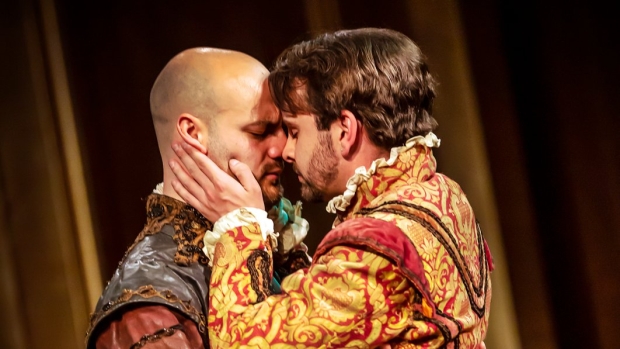Starcrossed at Wilton's Music Hall – review
Rachel Garnet’s twist on the Bard’s classic runs until 25 June

© Pamela Raith
Of all the Shakespearean canon, Romeo and Juliet must surely be the most riffed-upon. Less intimidating perhaps than the big four tragedies, more accessible than the late romances and the Romans, less problematic than Shrew and The Merchant of Venice, and as familiar as the major comedies, this tale of youthful lovers from Verona has consistently provided rich fodder for adaptation. Everybody from Bernstein and Sondheim (West Side Story) to pop genius Max Martin (& Juliet, still nightly blasting the roof off the Shaftesbury and about to do the same in North America) to Baz Luhrmann with his modernist film reworking, has had a go at it.
American playwright Rachel Garnet's take, critically acclaimed in the States and now receiving a flawless UK premiere by director Philip Wilson, has to be one of the most original yet. The "starcross'd lovers" here aren't Romeo and Juliet at all (although both appear, to potent effect) but their respective allies Mercutio and Tybalt.
The sheer ingenuity with which Garnet mirrors the original play is remarkable in itself – familiar speeches are repointed to reflect the different characters and genders, yet remain faithful to the spirit of the source – but becomes positively breathtaking when one realises that, despite the radical subversion of the central love story, the bare bones of Shakespeare's plot still works so brilliantly well. It's an astonishing example of having one's theatrical cake and eating it: scholars of the Bard will understand why this is such a clever variation, while anybody who doesn't know Romeo and Juliet will just be gripped by the story.
If the first half, which begins like the original but then goes subtly, joyously off (Shakespearean) script as the apparently mismatched men (Mercutio is a flamboyant bon viveur while Tybalt's a rigid tough guy) find each other, is a witty delight, act two reveals the show's beautiful heart. That heart proves subtly transformative: imagine that the infamous, fatal duel between Mercutio and Tybalt is set up for a very different reason than the one that Shakespeare wrote, that Tybalt is driven by a familial disappointment so huge that it colours his whole being, that Mercutio, for all his sass and wit, is so disaffected that he can barely connect until he falls for Tybalt. Garnet has added an LGBTQ rainbow of colours as well as acute psychological insights to these familiar, apparently minor, figures, that gives the tale a new urgency. See this and you're unlikely to view Romeo and Juliet the same way ever again.
Connor Delves, a holdover from the American premiere, is truly fabulous; possessed of a sprite-like joie de vivre at first, he gently, then devastatingly, indicates Mercutio's surrender to feelings bigger than himself. His speech at the top of act two where he confronts the realisation that this love story is destined to play out in the shadows, while wishing better for future generations, is a masterpiece. Tommy Sim'aan's sensitively realised Tybalt makes it entirely clear why somebody would fall for him so completely. An intriguing mix of melancholy and swaggering bravado, he fully convinces as an alpha male unable to find his place in the world. The chemistry between the two men is palpable.
The astonishingly versatile Gethin Alderman plays everything else, including an earnest Romeo, a Lord Capulet with a whiff of Prince Charles about him, a hilarious yet oddly touching Juliet, and a drunken street beggar with a surprising connection to one of the main characters. Looking like a young Adam Godley and capable of an authentic gravitas when required but also a joyous gift for physical comedy, Alderman is an athletic, shape-shifting delight.
Wilson's production knows exactly what it's doing; from Ruari Murchison's period-gorgeous costumes and simple but attractive set reminiscent of the Sam Wanamaker Playhouse, the epic fight choreography by Haruka Kuroda and Lawrence Carmichael, to the unobtrusive but atmospheric lighting and sound designs of Simsola Majekodunmi and Harry Blake respectively, there are barely enough superlatives.
On top of all that, there is Garnet's fiendishly clever writing, seamlessly blending with bits of the original text, but finding its own thrum and dynamic. Purists may argue that the dialogue is "Shakespeare-lite" – in fact, it sometimes sounds closer to Restoration Comedy than the Bard – but it is a stunning achievement. Its ambition and ingenuity are matched by an exquisite, poetic, tear-soaked depth of feeling.
This is an inspired bit of programming for Pride month, but a play, production and performances this fine would be a must-see at any time of the year. Get thee to Wilton's!












